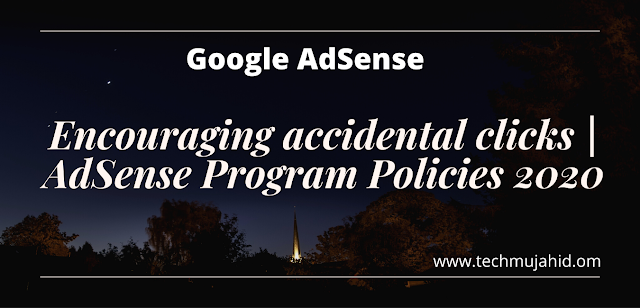Encouraging accidental clicks | AdSense Program Policies

Hi, everyone. My name is Mujahid Hussain, and I lead our external outreach efforts, representing the trust and Safety Team. My role is to help you, our publishers, better understand our policies and publisher restrictions. And, importantly, I also work with our internal teams to help them better understand the challenges you face.
Today I'd like to talk about our publisher policy around implementationsthat encourage clicks. First off, why do we care about this? We're always working to facilitate a healthy digital advertising ecosystem. Importantly, this means we create policies and publish restrictions to help ensure that our users, advertisers, and publishers are protected and can trust in that ecosystem.
This works best when users click on ads from genuine interest on sites with valuable content. When publishers encourage users to click on ads in hopes of making money, the users' clicks are not out of genuine interest in the ads. If we allow these invalid clicks, advertisers will lose out, and trust in the network would be greatly reduced.
Furthermore, encouraging clicks could lead to bad user experience, as the publishers more concerned with making money than with providing genuinely useful content for users. Generally, we don't want publishers to place ads in a way that makes it difficult for a user to distinguish content from ads. So what types of implementations encourage accidental clicks?
Basically, any deceptive implement station designed to obtain clicks would fall under encouraging accidental clicks. This includes, but is not limited to, compensation to users for viewing ads or performing searches, encouraging users to click on Google Ads using phrases such as click this ad, support us, visit these links, or any other such language, using graphical elements to highlight an ad, placing misleading images alongside ads, formatting ads such that they are indistinguishable from content, formatting content such that itis indistinguishable formats, placing misleading labels above Google ad units.
Ads should only be labeled as sponsored links or advertisements. In short, we want to help create an environment where users are not tricked and advertisers don't waste money on unintended clicks. If we determine that publishers have implementations that are designed to cause unintended clicks, we can impose restrictions on the ability of that publisher to receive certain sources of advertising. If your content is labeled with a Google Publisher policy violation, Google may block ads from appearing against your content or suspend or terminate your account.
Therefore, it's important that publishers follow our posted Help Center policies, content restrictions, and best practices. We are always working to facilitate a healthy digital advertising ecosystem. The future of Google and our partners are linked, and we believe in fostering an environment where users, advertisers, and publishers can all thrive in a healthy digital advertising ecosystem. By valuing each party, we help ensure the sustainability of our industry. We hope this video helps you to better understand our published policy for encouraging accidental clicks.
https://www.techmujahid.com/2020/06/Why-do-i-have-invalid-traffic-concerns-in-my-Adsense-account.html







